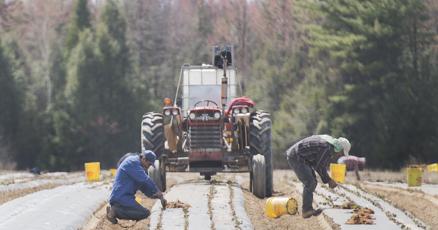In a landmark legal challenge that could reshape agricultural safety standards across Canada, Health Canada faces mounting pressure as farm workers and advocacy organizations have filed a lawsuit alleging systemic failure to protect agricultural laborers from dangerous pesticide exposure.
The lawsuit, filed this week in federal court, contends that Health Canada has consistently prioritized industry interests over worker safety by allowing the continued use of pesticides that have been banned in other developed nations due to their documented health risks.
“Agricultural workers are falling through massive regulatory gaps while being exposed to chemicals linked to cancer, neurological damage, and reproductive harm,” said Maria Hernandez, lead counsel for the plaintiffs and director at the Canadian Agricultural Workers Alliance. “These are among our most vulnerable laborers, often immigrants and temporary foreign workers who fear reporting illness or injury.”
The legal action focuses on Health Canada’s Pest Management Regulatory Agency (PMRA), which plaintiffs allege has ignored substantial scientific evidence documenting adverse health effects. Court documents reveal that Canadian agricultural workers experience chemical exposure rates 64% higher than the general population, with monitoring programs detecting concerning levels of pesticide metabolites in their blood and urine samples.
“What we’re seeing is a systematic failure to implement the precautionary principle that supposedly guides our regulatory approach,” explained Dr. Robert Chen, toxicologist at the University of Toronto, who is not involved in the litigation but has studied pesticide effects for three decades. “When the science shows potential harm, the burden should not fall on workers to prove they’re being poisoned.”
Health Canada has declined specific comment on the pending litigation, but spokesperson Jennifer Morrison stated that “the department takes its regulatory responsibilities seriously and continuously reviews scientific evidence to ensure all approved products meet Canada’s high safety standards.”
Industry representatives contend that current regulations are sufficient. “Canadian agricultural producers follow some of the most stringent application protocols in the world,” said Andrew Blackwell of the Canadian Agricultural Products Association. “This lawsuit ignores the extensive safety measures already in place.”
However, internal documents obtained through access to information requests and filed as evidence suggest Health Canada officials were aware of safety concerns but delayed regulatory action. In one 2022 email, a senior PMRA official acknowledged that “political considerations” were influencing the timeline for pesticide reviews.
For affected workers like Miguel Santos, a seasonal farmworker in Ontario’s tomato fields for eight years, the lawsuit represents hope for change. “I developed breathing problems, headaches, and skin rashes that doctors linked to the chemicals,” Santos said through an interpreter. “But we have no choice—it’s work or starve.”
The Canadian political landscape has seen increasing tensions between agricultural industry lobbying power and growing public demand for stricter environmental and health protections. Several Canadian provinces have attempted to implement their own stricter pesticide regulations, creating a patchwork of protections that plaintiffs argue should be standardized at the federal level.
Environmental law experts suggest the case could establish important precedents for regulatory accountability. “This lawsuit asks fundamental questions about whether our regulatory system is fulfilling its mandate to protect public health,” explained environmental law professor Elizabeth Warren at Dalhousie University. “The courts will need to determine if Health Canada has acted reasonably given the scientific evidence at hand.”
The economic implications also factor heavily into the debate. Business analysts note that while transitioning to safer alternatives may increase short-term costs, international market trends suggest Canadian agricultural exports could benefit from stricter standards as global consumers increasingly demand chemical-free products.
As the news of this lawsuit spreads across the agricultural community, it raises a crucial question that extends beyond legal technicalities: in a country that prides itself on progressive health and safety standards, should our food production system continue to expose its most vulnerable workers to chemicals deemed too dangerous for use in the European Union, Australia, and other comparable jurisdictions?

























